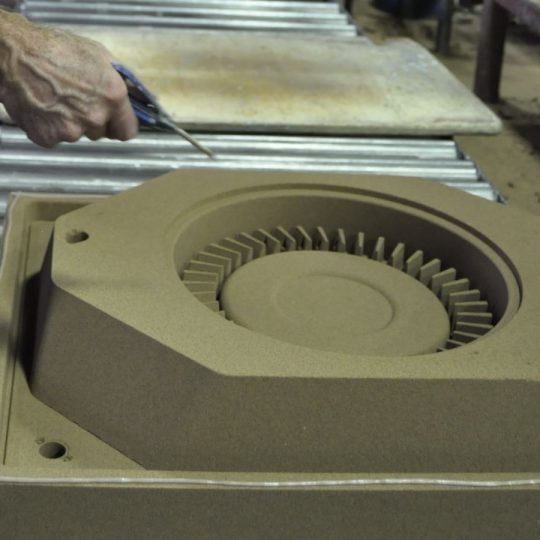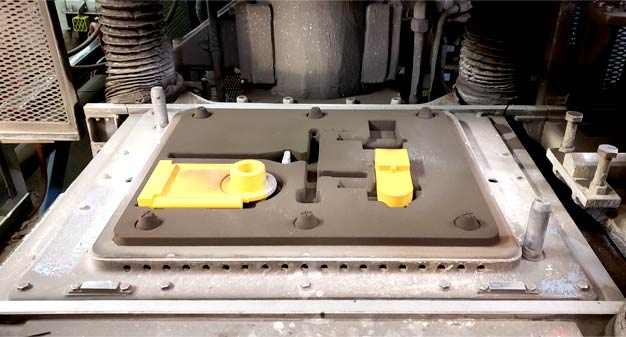Discover the Benefits of Aluminum Casting in Modern Production
Aluminum casting has arised as an essential process in contemporary manufacturing. Its light-weight yet robust nature provides substantial advantages for numerous sectors. The capability to attain complex layouts and preserve limited tolerances includes in its allure. aluminum casting. Additionally, the cost-effectiveness and ecological benefits make it a lasting selection. As makers look for innovative solutions, the role of aluminum casting remains to advance. What details applications and benefits wait for expedition in this vibrant field?
Lightweight Yet Solid: The Benefits of Aluminum
Many materials are utilized in production, aluminum stands out due to its exceptional combination of light-weight properties and outstanding strength. This special feature makes aluminum an excellent choice for numerous applications, particularly in industries such as auto, aerospace, and building and construction. Its low density enables for less complicated handling and transport, adding to lowered energy intake throughout production and assembly processes.
Furthermore, aluminum's strength-to-weight ratio is impressive, making it possible for makers to create resilient parts without adding unneeded bulk. This characteristic is particularly valuable in sectors where weight reduction can lead to enhanced fuel efficiency and overall performance. Furthermore, aluminum's resistance to corrosion improves the durability of products, even more solidifying its charm in modern-day production.
Eventually, the light-weight yet solid nature of aluminum positions it as a recommended product, cultivating technology and effectiveness across multiple sectors. Producers increasingly recognize that these benefits can lead to substantial advancements in design and capability.
Precision and Intricacy in Design
As suppliers accept the capabilities of aluminum casting, they find brand-new avenues for precision and complexity in style. This manufacturing procedure enables for the production of complex forms and thorough features that typical techniques often have a hard time to attain. The fluidity of molten aluminum enables it to fill intricate mold and mildews, resulting in components with limited tolerances and great surface finishes.
This precision is particularly useful in markets such as aerospace and automobile, where precise specifications are necessary for performance and safety. Aluminum casting also suits ingenious layouts that boost performance without compromising structural honesty.

Cost-Effectiveness and Efficiency
Cost-effectiveness and effectiveness are critical considerations for producers discovering aluminum casting as a manufacturing technique. Aluminum casting deals substantial expense benefits because of its lower material costs contrasted to other metals (Precision aluminum casting). The lightweight nature of aluminum decreases delivery and handling expenditures, and its exceptional thermal conductivity permits quicker cooling times throughout the casting procedure, improving overall manufacturing rate
Moreover, aluminum's versatility enables more info here suppliers to produce intricate shapes and styles, decreasing the requirement for extra machining or setting up. This streamlining of manufacturing not only reduces labor prices yet likewise shortens lead times, enabling companies to react promptly to market demands.
Moreover, the sturdiness and deterioration resistance of aluminum spreadings contribute to longer item lifespans, minimizing replacement expenses with time. Because of this, makers can attain an equilibrium of high-grade result and minimized operational expenses, making aluminum casting a progressively attractive option in modern manufacturing.
Environmental Sustainability of Aluminum Casting
Aluminum casting stands apart as an eco sustainable production choice, especially due to its recyclability and decreased environmental footprint. The procedure allows for the reliable use aluminum, a material that can be recycled indefinitely without shedding its properties. This particular significantly reduces the demand for virgin aluminum, therefore preserving all-natural sources and minimizing power usage associated with removal and processing.

Applications Across Industries: From Automotive to Aerospace
While varied sectors remain to look for innovative materials for manufacturing, aluminum casting has actually proven to be a functional service throughout fields such as automobile and aerospace. In the automotive sector, aluminum castings contribute to light-weight automobile styles, boosting gas effectiveness and performance. Elements like engine blocks, transmission real estates, and wheels profit from aluminum's strength-to-weight ratio.
In aerospace, aluminum casting plays a considerable function in generating complex parts that need high longevity and low weight. Aircraft elements such as braces, landing gear, and architectural structures make use of aluminum for peak performance and safety and security.
Moreover, the versatility of aluminum casting permits it to accommodate various other markets, including consumer electronics, marine, and commercial machinery. This adaptability not just meets the details demands of various applications yet likewise supports continuous development in producing processes. Because of this, aluminum casting remains a principal in modern-day production across many sectors.
Frequently Asked Inquiries
Just How Does Aluminum Casting Compare to Other Steel Casting Processes?
Aluminum casting deals remarkable strength-to-weight proportions, faster cooling prices, and outstanding rust resistance compared to various other steel casting procedures. These advantages make it excellent for numerous applications, boosting efficiency and performance in manufacturing.
What Are the Common Lead Times for Aluminum Casting Projects?
Regular lead times for aluminum casting jobs vary from 2 to eight weeks, relying on elements such as intricacy, order dimension, and manufacturing capability. Effective planning can aid minimize delays and improve project timelines.
Can Aluminum Casting Be Used for Intricate Designs?
Aluminum casting can without a doubt accommodate detailed layouts. Aluminum Casting Company. Its fluidity permits for detailed patterns and shapes, making it suitable for complex components in numerous industries. This adaptability improves design liberty while keeping structural stability and performance
What Post-Processing Options Are Readily Available After Aluminum Casting?
Post-processing options for aluminum casting include machining, polishing, surface therapies, anodizing, and welding. These methods enhance the finish, enhance dimensional precision, and boost deterioration resistance, thus maximizing the end product's performance and aesthetic appeal.
Just How Do Temperature Level Adjustments Affect Aluminum Casting Top Quality?
Temperature changes substantially impact aluminum casting quality by impacting fluidity, solidification prices, and like this possible issues. Rapid cooling can lead to increased brittleness, while too much heat might cause bending or incomplete dental filling of molds throughout casting.
Aluminum casting has emerged as a pivotal procedure in modern-day manufacturing. As manufacturers welcome the abilities of aluminum casting, they discover brand-new avenues for precision and complexity in design. Aluminum casting processes usually produce fewer greenhouse gas exhausts contrasted to other metal casting methods. While diverse sectors continue to seek cutting-edge products for production, aluminum casting has proven to be a flexible service across industries such as auto and aerospace. In the vehicle sector, aluminum spreadings add to light-weight vehicle designs, enhancing fuel effectiveness and performance.